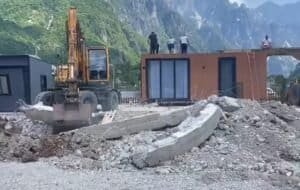In a functioning democracy, laws are not selectively applied and court rulings are not optional. They are legally binding obligations. Yet in Albania, government agencies are bulldozing structures that courts have protected with injunctions, acting as both enforcer and judge in their own right. This is not just a conflict over zoning — it is a test of institutional boundaries.
According to Albania’s own territorial planning law, temporary and non-foundational structures made of removable materials are explicitly allowed for up to 12 months through prior declaration. But the government appears more focused on projecting strength than respecting the very laws it claims to enforce — even if that means undermining the justice system it proudly labels as one of its main reforms.
🏔️ Theth: A remote mountain village at the center of a national constitutional crisis
Theth is not just a tourist destination. It is one of Albania’s most treasured alpine villages, known for its natural beauty and cultural heritage. For years, locals have built small, removable guest structures to accommodate visitors in the absence of public infrastructure.
Some of these structures have been explicitly protected by court rulings through interim measures. Yet the state has proceeded with demolitions, using force and without transparency.
More alarmingly, the government has refused to acknowledge the legitimacy of these court decisions, instead asserting its executive power as if it overrides the judiciary. This behavior sets a dangerous precedent that threatens the separation of powers and the fundamental basis of legal order.
🗣️ From political statements to unconstitutional action
What amplifies the concern is the rhetoric. Government officials have made public statements dismissing court rulings as bureaucratic obstacles rather than legal mandates.
Such rhetoric suggests that law enforcement depends on political will, not independent institutions. This mindset is far more characteristic of authoritarian regimes than of a constitutional democracy.
By treating court orders as optional, the executive is not just undermining justice — it is eroding the very foundation of trust between citizens and the state.
📉 The damage extends far beyond Theth
This is not just a legal or symbolic issue. It carries severe political, economic, and international consequences.
Public trust in the justice system is being severely damaged. Potential investors are receiving a clear message: there is no legal certainty in Albania. In sectors like sustainable tourism and local development, the sense of risk is growing rapidly.
While Albania seeks to prove to its international partners that it is ready for EU integration, scenes like the one in Theth — where government bulldozers ignore court orders — directly contradict the narrative of a successful justice reform.
📍 This is more than a dispute over wooden huts — it is a test of Albania’s democracy
Theth is not just a village. What happened there is a national test of whether Albania will respect the rule of law or revert to rule by force.
If the government can choose which court decisions to obey, then no citizen is truly protected. If this test fails, the loss will not be limited to Theth, but will extend to every Albanian who still believes in justice, rights, and the separation of powers.



